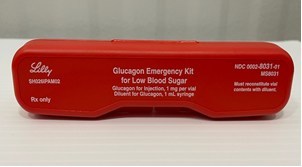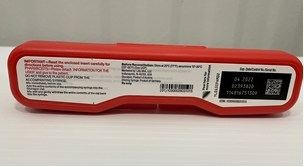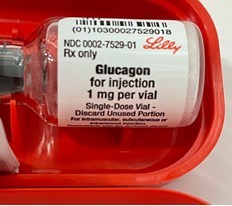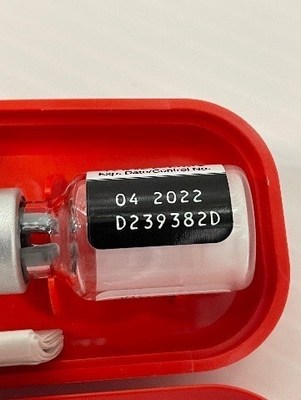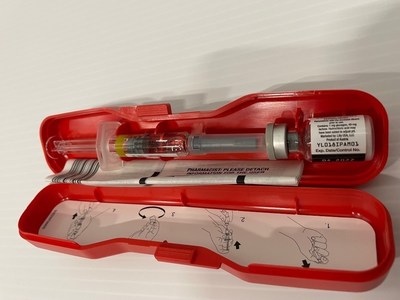Eli Lilly and Company Issues Voluntary Nationwide Recall of One Lot of GLUCAGON® Emergency Kit Due to Loss of Potency
Eli Lilly (NYSE: LLY) is recalling lot D239382D of its Glucagon Emergency Kit due to a complaint that the vial contained liquid instead of the intended powder form. This issue may lead to decreased effectiveness in treating severe hypoglycemia, posing serious health risks including seizures. The recall was initiated after a patient experienced a lack of drug effect and subsequent seizures. Distribution of the affected lot has been ceased, and return and replacement measures are underway for consumers and wholesalers.
- None.
- Recall of Glucagon Emergency Kit lot D239382D due to loss of potency.
- Patient reported lack of drug effect leading to seizures, indicating potential health risks.
INDIANAPOLIS, Sept. 24, 2021 /PRNewswire/ -- Eli Lilly and Company (NYSE: LLY) is voluntarily recalling lot D239382D, Expiration April 2022, of Glucagon Emergency Kit for Low Blood Sugar (Glucagon for Injection, 1 mg per vial; Diluent for Glucagon, 1 mL syringe), to the consumer/user level. Lilly is recalling lot D239382D to the patient level because of a product complaint reporting that the vial of Glucagon was in liquid form instead of the powder form. The firm's investigation indicates that the liquid in this Glucagon vial could be related to the manufacturing process. The use of the liquid form of this product may fail to treat severe low blood sugar due to loss of potency.
Risk Statement: Severe hypoglycemia in patients with diabetes, if not reversed, can potentially cause adverse health consequences ranging from transient, minor complaints to neurological damage, seizures, and even death if not promptly treated. Associated with the one product complaint, it was reported to Lilly that the involved patient experienced lack of drug effect and also reported subsequent seizures.
Glucagon Emergency Kit is used as an anti-hypoglycemic agent and a gastrointestinal motility inhibitor indicated for the treatment of severe hypoglycemia in pediatric and adult patients with diabetes mellitus.
The product is packaged in a kit containing 1mg of freeze-dried (lyophilized) product in a 3 mL vial and a pre-filled diluent syringe. The affected Glucagon Emergency Kit lot is D239382D and the expiration date is April 2022 (label expiry date: 04 2022). The lot number can be found on the label of the kit as well as the vial (refer to the photos provided). The lot was distributed nationwide to wholesalers and retailers.
Lilly is deeply committed to manufacturing high-quality medicines for patients who need them, and the safety and quality of our products is our highest priority. We take our obligations seriously and have rigorous quality systems in place to ensure compliance with stringent regulatory requirements.
Lilly is notifying its distributors and customers by written communication and is arranging for return and replacement of all recalled products. Wholesalers and Distributors with an existing inventory of Glucagon Emergency Kit lot D239382D should cease distribution and quarantine the product immediately.
Instructions for Wholesalers and Pharmacists
If you have distributed the recalled product, please notify any accounts or additional locations which may have received product from the recalled lot from you. Please conduct a sub-recall to those accounts and communicate this recall information immediately. Please request they immediately cease distribution of the product and promptly contact Sedgwick at 877-907-7032 (Interactive Voice Recording), 877-884-9410 (Fax), or elililly7484@sedgwick.com (Mon.-Fri. 8:00 am - 5:00 pm ET) to obtain a Business Reply Card (BRC) to initiate the return process.
Instructions for Consumers
Consumers in possession of Glucagon Emergency Kit lot D239382D should contact The Lilly Answers Center at 1-800-LILLYRX (1-800-545-5979) for return and replacement instructions for the product (hours of operation are Monday- Friday, 9AM – 7PM EST) and should contact their health care provider for guidance. Consumers should contact their physician or healthcare provider if they have experienced any problems that may be related to taking or using this product.
Adverse reactions or quality problems experienced with the use of this product may be reported to the FDA's MedWatch Adverse Event Reporting program either online, by regular mail or by fax.
- Complete and submit the report Online: www.fda.gov/medwatch/report.htm
- Regular Mail or Fax: Download form www.fda.gov/MedWatch/getforms.htm or call 1-800-332-1088 to request a reporting form, then complete and return to the address on the pre-addressed form, or submit by fax to 1-800-FDA-0178
This recall is being conducted with the knowledge of the U.S. Food and Drug Administration.
Purpose and Safety Summary
Important Facts About GLUCAGON (GLOO-ka-gon). It is also known as glucagon for injection.
GLUCAGON is a prescription medicine used to treat very low blood sugar (severe hypoglycemia) in people with diabetes mellitus, and to stop movement in the intestines in people receiving radiology exams.
Warnings
Do not use GLUCAGON if:
- you have a tumor in the gland on top of your kidneys (adrenal gland) called a pheochromocytoma.
- you have a tumor in your pancreas called an insulinoma.
- you have a tumor in your pancreas called a glucagonoma because it could cause low blood sugar when used for your radiology exam.
- you are allergic to glucagon or lactose or any of the ingredients in GLUCAGON.
GLUCAGON may cause serious side effects, including:
High blood pressure. GLUCAGON can cause high blood pressure in certain people with tumors in their adrenal glands.
Low blood sugar. GLUCAGON can cause certain people with tumors in their pancreas to have low blood sugar. Signs and symptoms of low blood sugar may include sweating, blurred vision, abnormal behavior, drowsiness, hunger, lightheadedness, dizziness, slurred speech, unsteady movement, sleep disturbances, restlessness, inability to concentrate, irregular heartbeat, depressed mood, personality changes, anxiety, tingling in the hands, feet, lips or tongue, headache, tremor, and irritability.
Very low blood sugar can cause confusion, seizures, passing out (loss of consciousness), and death. Talk to your healthcare provider about how to tell if you have low blood sugar and what to do if this happens while using GLUCAGON. Know your symptoms of low blood sugar. Follow your healthcare provider's instructions for treating low blood sugar.
Serious allergic reaction. Call your doctor or get medical help right away if you have a serious allergic reaction including:
- rash
- low blood pressure
- difficulty breathing
High blood sugar. If you receive GLUCAGON before your radiology exam, it can cause high blood sugar. Your healthcare provider will monitor your blood sugar levels during your treatment.
Heart problems. If you have heart problems and receive GLUCAGON before your radiology exam, you may have an increase in your blood pressure and pulse while using GLUCAGON, which could be life-threatening. Your healthcare provider will monitor your heart during treatment.
Common side effects
The most common side effects of GLUCAGON include:
- swelling at the injection site
- redness at the injection site
- vomiting
- nausea
- decreased blood pressure
- weakness
- headache
- dizziness
- pale skin
- diarrhea
- sleepiness or drowsiness
These are not all the possible side effects of GLUCAGON. For more information, ask your doctor.
Call your doctor for medical advice about side effects. You are encouraged to report side effects of prescription drugs to the FDA. Visit www.fda.gov/medwatch, or call 1-800-FDA-1088.
Before using
Before getting GLUCAGON, tell your health care provider about all your medical conditions, including if you:
- have adrenal problems
- have pancreas problems
- have not had anything to eat or have not had a drink of water for a long time (prolonged fasting or starvation)
- have low blood sugar that does not go away (chronic hypoglycemia)
- have heart problems
- are pregnant or plan to become pregnant. It is not known if GLUCAGON will harm your unborn baby.
- are breastfeeding or plan to breastfeed. It is not known if GLUCAGON passes into your breast milk.
Tell your doctor about all the medicines you take, including prescription and over-the-counter medicines, vitamins, and herbal supplements.
How to use
- Read the detailed Instructions for Use that comes with GLUCAGON.
- Use GLUCAGON exactly how your healthcare provider tells you to use it.
- Make sure your caregiver knows where you keep your GLUCAGON and how to use GLUCAGON the right way before you need their help.
- Act quickly. Having very low blood sugar for a period of time may be harmful.
- After GLUCAGON is mixed, make sure it is clear and of water-like consistency. Do not use if it has particles or is discolored.
- After giving GLUCAGON the caregiver should call for emergency medical help right away.
- The caregiver should turn the person on their side to prevent them from choking.
- If the person does not respond after 15 minutes, another dose may be given, if available.
- Eat sugar or a sugar-sweetened product such as a regular soft drink or fruit juice as soon as you are able to swallow.
Tell your healthcare provider each time you use GLUCAGON. Your healthcare provider may need to change the dose of your diabetes medicines.
Before you mix the GLUCAGON powder and liquid:
- Do not use GLUCAGON if the expiration date has passed.
- Store GLUCAGON at room temperature between 68°F to 77°F (20°C to 25°C).
- Do not freeze GLUCAGON.
- Keep GLUCAGON in its original package and away from light.
- After you mix the GLUCAGON powder and liquid:
- Use GLUCAGON right away.
- Throw away unused GLUCAGON.
Keep GLUCAGON and all medicines out of the reach of children.
Learn more
For more information, call 1-800-545-5979 or go to www.lillyglucagon.com.
Medicines are sometimes prescribed for purposes other than those listed in a Patient Information leaflet. Do not use GLUCAGON for a condition for which it was not prescribed. Do not give GLUCAGON to other people, even if they have the same symptoms that you have. It may harm them.
This summary provides basic information about GLUCAGON but does not include all information known about this medicine. You can ask your pharmacist or doctor for information about GLUCAGON that is written for health professionals. This information does not take the place of talking with your doctor. Be sure to talk to your doctor or other health care provider about GLUCAGON and how to take it. Your doctor is the best person to help you decide if GLUCAGON is right for you.
GLUCAGON is available by prescription only.
GLUCAGON™ is a trademark owned or licensed by Eli Lilly and Company, its subsidiaries, or affiliates.
GLUC CON BS FEB2021
About Eli Lilly and Company
Lilly is a global healthcare leader that unites caring with discovery to make life better for people around the world. We were founded more than a century ago by a man committed to creating high-quality medicines that meet real needs, and today we remain true to that mission in all our work. Across the globe, Lilly employees work to discover and bring life-changing medicines to those who need them, improve the understanding and management of disease, and give back to communities through philanthropy and volunteerism. To learn more about Lilly, please visit us at lilly.com and lilly.com/newsroom. P-LLY
Refer to: | Gregory A. Kueterman; kueterman_gregory_andrew@lilly.com; 317-432-5195 (Media) |
Kevin Hern; hern_kevin_r@lilly.com; 317-277-1838 (Investors) |
![]() View original content to download multimedia:https://www.prnewswire.com/news-releases/eli-lilly-and-company-issues-voluntary-nationwide-recall-of-one-lot-of-glucagon-emergency-kit-due-to-loss-of-potency-301385033.html
View original content to download multimedia:https://www.prnewswire.com/news-releases/eli-lilly-and-company-issues-voluntary-nationwide-recall-of-one-lot-of-glucagon-emergency-kit-due-to-loss-of-potency-301385033.html
SOURCE Eli Lilly and Company
FAQ
What lot number of Glucagon Emergency Kit is being recalled by Eli Lilly?
Why is Eli Lilly recalling the Glucagon Emergency Kit?
What risks are associated with the recalled Glucagon lot D239382D?
How can consumers return the recalled Glucagon Emergency Kit?







